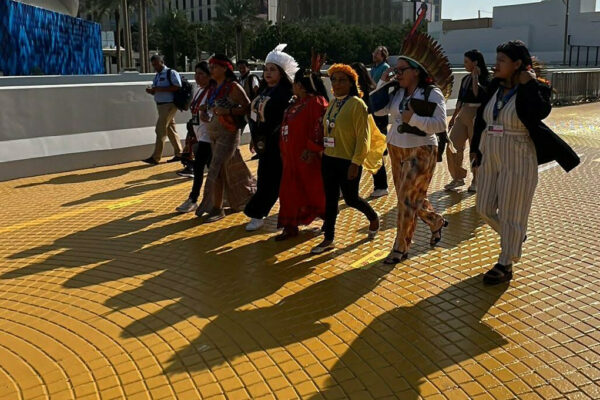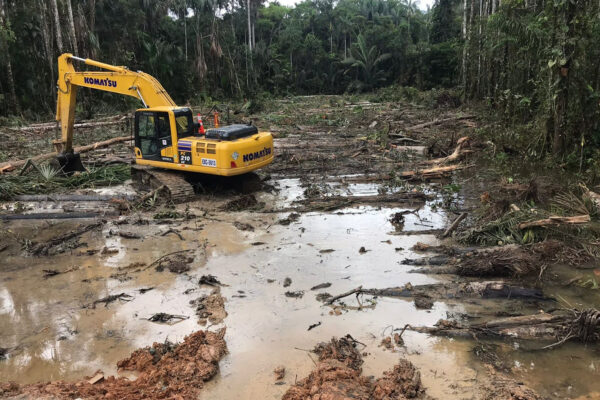Los Angeles – For the past six months, Vice President Al Gore and his representatives have engaged in quiet talks with environmental activists over the activists’ demands that Mr. Gore shed his family’s shares in Occidental Petroleum Corp.
Occidental is seeking to drill on land claimed by the 5,000-member indigenous U’wa tribe in Colombia. The U’wa have vowed to walk off a 1,400-foot cliff in the Andes if Occidental drills on the land, which they consider sacred.
The issue, which has dogged Mr. Gore throughout the presidential campaign season, will come to a head Monday when thousands of activists plan to take to the streets outside the Democratic Convention here to protest Occidental’s plans.
So far, Mr. Gore has refused to sell the Occidental shares, which his May 22 public financial disclosure report valued at between $500,000 and $1 million.
The shares originally belonged to Mr. Gore’s father, Albert Gore Sr., who died in 1998, and are part of a trust for Mr. Gore’s mother, Pauline, a Gore spokesman said Sunday.
Although Mr. Gore is the executor of his father’s estate, which still includes the shares, “Al Gore does not own shares in Occidental,” the spokesman, Doug Hattaway, said.
The issue threatens to embarrass Mr. Gore, who has made environmental protection a centerpiece of his campaign. Indeed, on Saturday, Mr. Gore visited the Springdale, Pa., home of Rachel Carson, whose 1962 book, “Silent Spring,” brought environmental concerns to the forefront.
The environmental activists, who also want Mr. Gore to issue a statement condemning Occidental’s plans to drill, say Mr. Gore’s refusal so far to shed the shares means that Monday’s planned protest against Occidental will become a protest against the presumed Democratic presidential candidate.
The activists reject Mr. Gore’s argument that he can’t unload the stock because it belongs to his mother. “This is rubbish in my mind,” says Steve Kretzmann, a consultant with Amazon Watch who has been in talks with Mr. Gore and his representatives. “He’s the executor of the estate. “
Already, Republicans are seizing on the chance to criticize Gore ties to Occidental. A Republican television ad that began airing last Tuesday in key battleground states criticizes Mr. Gore for receiving royalty payments from a zinc-mining operation on Gore land in Tennessee that has been cited for polluting a nearby river. Albert Gore Sr. purchased the land in 1973 from an Occidental subsidiary and sold it to his son a year later.
For years, the senior Mr. Gore maintained a close business relationship with Occidental founder and Chief Executive Armand Hammer. When he left the Senate in 1970, Mr. Gore Sr. went to work for an Occidental subsidiary and took a seat on Occidental’s board of directors.
The talks between the vice president’s representatives and the environmentalists began back in February after activists started an intense campaign of heckling and demonstrating at Gore rallies and outside Gore regional campaign headquarters.
A handful of demonstrators crashed a Gore campaign speech in Oakland, Calif., and started chanting about the U’wa. Mr. Gore responded then that he would meet with the activists afterwards if they stopped interrupting his speech. He met with a handful of demonstrators for about 20 minutes, and told them to call the office of his chief foreign-policy adviser, Leon Fuerth.
The two sides spoke five or six times in late February, according to Mr. Kretzmann of Amazon Watch. The environmentalists said they would stop heckling Mr. Gore if he sold the shares and produced a statement criticizing Occidental. The Gore camp balked, the activists say. The talks fell apart in March.
Talks began again three weeks ago when Mr. Kretzmann saw Katie McGinty, Mr. Gore’s chief environmental adviser, at an environmental forum in Washington. He approached her and asked to talk about the U’wa issue. The two had three subsequent conversations on the phone, ending last Wednesday, but failed to agree.
Meanwhile, the New York Times reported that Dick Cheney, the Republican vice presidential nominee, got a break on his retirement settlement from Halliburton Co., of which he was chief executive before accepting the nomination. According to Securities and Exchange Commission filings, Mr. Cheney in 1995 received restricted shares now worth about $10.2 million and is due stock options now worth about $12 million.
Those benefits might have been in jeopardy because Mr. Cheney took early retirement to join Gov. George W. Bush’s ticket. But Halliburton has said the company’s board voted to allow Mr. Cheney to retire with full benefits.
Write to Helene Cooper at helene.cooper@wsj.com













